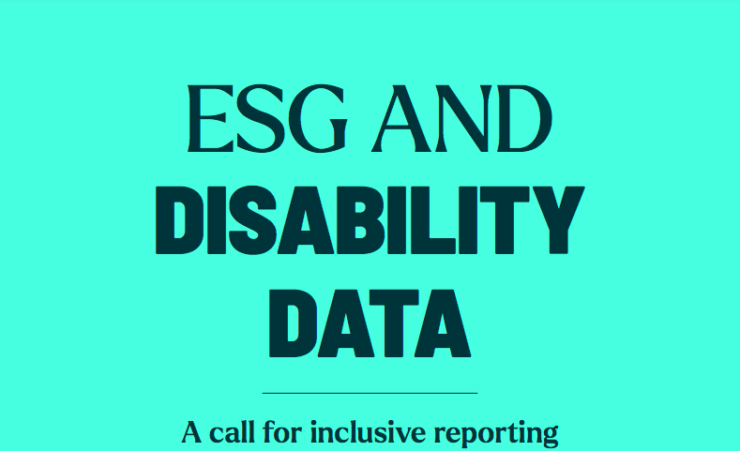June 2024
Organisations should include W3C Web Content Accessibility Content (WCAG) conformance within the scope of their Environmental Social and Governance (ESG) programmes
In July 2023 I proposed that organisations could greatly improve the accessibility of their digital service through conformance to the W3C Web Content Accessibility Content Guidelines (WCAG). I further proposed that this could and should be managed within organisations’ existing Environmental, Social, and Governance (ESG) programmes. At the time that I made that proposal I thought this was a novel thought. However, I am now delighted to have learnt that significant pre-existing work exists on this.
The most significant work that I have discovered to date is that of the Valuable 500. The Valuable 500 is a ‘global organisation of more than 500 partners and companies working together to end disability’. The Valuable 500 published a white paper in 2023 entitled ‘ESG and Disability Data’.
This report identifies five key KPIs for reporting in ESG including: ‘Digital Accessibility – Has your company undertaken a review of the accessibility of its digital platforms and content? If not, does the company have a plan to undertake a review over the next calenda year?’
This is now particularly relevant in Europe where all public sector and some private sector industries websites and mobile apps must conform to WCAG by the summer of 2025. This applies to all organisations that do business in the EU. Further details are contained in Part 9 of my blog.
It is my personal observation that most organisations that have adopted the ESG business framework have focused on their Environmental credentials, with the Social aspects being of lesser importance. It appears that some organisations consider the ‘S’ in ESG to stand for sustainable.
Is digital accessibility part of ESG?
I believe that the Environment (aka Sustainability) and Artificial Intelligence are currently the two hottest topics within the IT industry. It was with that in mind that I asked ChatGPT to answer the following question: ‘Is digital accessibility part of ESG?’. The answer was lengthy and I have only included the first and last paragraphs below:
‘Yes, digital accessibility is increasingly considered an important aspect of Environmental, Social, and Governance (ESG) criteria, particularly within the “Social” component. ESG frameworks are used by investors to evaluate a company’s performance and ethical impact, and digital accessibility plays a critical role in promoting inclusivity and equal access to digital services and information for all individuals, including those with disabilities.
In summary, digital accessibility is a significant aspect of the social responsibility within ESG, reflecting a company’s commitment to inclusivity, legal compliance, and ethical governance.’
This final paragraph from ChatGPT summarises my thinking. The onus on organisations is to act now and follow the recommendations of the Valuable 500 white paper together with the forthcoming EU (and US) legislation and adopt WCAG now. The organisations’ conformance to WCAG being included within the scope of their ESG programme to deliver. No organisation can be excused for choosing to exclude disabled people from its external or internal digital services.
If you are interested to read the whole of the ChatGPT answer then I invite you to ask ChatGPT this question ‘Is digital accessibility part of ESG’.
My previous blog entries are:
- The IT Industry has been failing disabled people since the 1990s. https://archivesit.org.uk/blog/the-it-industry-must-do-more-for-disabled-people/
- The IT Industry has standards and guidelines dating back a quarter of a century. https://archivesit.org.uk/blog/the-it-industry-must-do-more-for-disabled-people-part-two/
- (ESG) the potential silver bullet that I have been searching for to make a step change to the accessibility of digital services. https://archivesit.org.uk/blog/the-it-industry-must-do-more-for-disabled-people-part-six/
- A summary of the story so far, as told in parts 1 – 6. https://archivesit.org.uk/blog/the-it-industry-must-do-more-for-disabled-people-part-seven/
- Awareness is a lifetime experience. https://archivesit.org.uk/blog-2/the-it-industry-must-do-more-for-disabled-part-8/
- Legislation and regulation are required to improve digital accessibility, but there are significant benefits to be gained from self-regulation. https://archivesit.org.uk/blog/the-it-industry-can-do-more-for-disabled-people-part-nine/
About the author
Chris Winter FIET FBCS CITP is an Ambassador for the Digital Poverty Alliance, an evangelist for digital accessibility and a former IBM Fellow, now retired.
About the Digital Poverty Alliance (DPA). The DPA defines Digital Poverty with five key determinants: the affordability of devices and connectivity, accessibility (for the disabled), skills, motivation and a lack of ongoing support. With the breadth of digital poverty being so broad. Its objective is to eradicate digital poverty in the UK by 2030.
